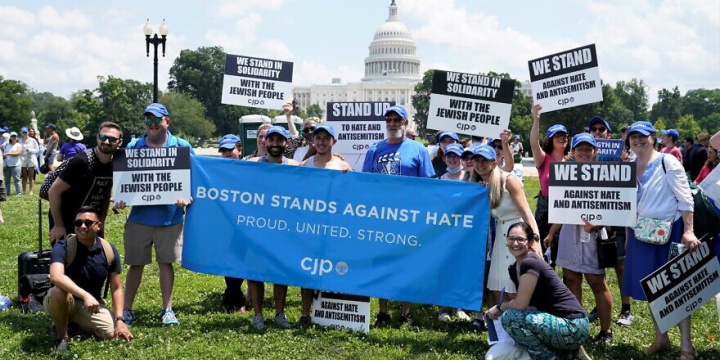 The Wrong Way to Fight Antisemitism
The Wrong Way to Fight Antisemitism
Irit Tratt
 A group from Boston at the “No Fear: A Rally in Solidarity With the Jewish People” on the National Mall in Washington, DC, July 11, 2021. Credit: Chris Kleponis.
A group from Boston at the “No Fear: A Rally in Solidarity With the Jewish People” on the National Mall in Washington, DC, July 11, 2021. Credit: Chris Kleponis.
Almost a year has passed since the American Jewish Committee released its report on “The State of Antisemitism in America.” The findings reveal that almost 80 percent of American Jews polled believe antisemitism in the United States increased in 2021. Interestingly, the study also found that nearly half of Jewish respondents think antisemitism is taken less seriously than other forms of hate or bigotry. For their part, the mainstream Jewish establishment’s response to rising antisemitism has ranged from holding rallies against Jewish hate and educating others about extremist threats, or small numbers of users fighting back on social media, such as when 12,000 Instagram users participated in #BlueOutFriday to display their solidarity with the Jewish community.
Yet the AJC’s survey mirrors a deeper issue surrounding why the US Jewish community is struggling to provide a convincing narrative underscoring the dangers of antisemitism. Put simply, decades spent propagating the misguided approach of universalizing anti-Jewish hate — and comparing antisemitism to all other forms of bigotry — fails to acknowledge the particularities associated with antisemitism. Moreover, the linking of antisemitism with other forms of hatred coincides with contemporary society promoting the placement of identities within the binary framework of oppressor or victim. Antisemitism is growing, but because of this misguided approach, the response to it has been lacking.
In a piece for National Affairs, professor Ruth Wisse explains how placing antisemitism under other categories of hate leads to its festering. Designed to bolster Title VI of The Civil Rights Act of 1964, whose definition was reinterpreted to include anti-discrimination language aimed at Jews and other religious groups, the Anti-Semitism Awareness Act (AAA) was passed by the US Senate in 2016. According to Wisse, the AAA’s passage was a direct result of the fact that antisemitism does not “comfortably fit the original legislative framework of the Civil Rights Act.” Rather, antisemitism is a “modern political phenomenon,” and its distinction lies in that it “misdirects attention to the Jews.”
Yet some American Jews are still primarily trying to equate antisemitism with other forms of hatred. Responding to the surge of antisemitic attacks over the last several years, Jewish solidarity marches are often punctuated with universal tones. Following the 2019 shooting at a kosher supermarket in Jersey City, which claimed the lives of five people, thousands came together the following year under the banner of “No Hate, No Fear,” with one group declaring that “antisemitism is equally as dangerous to our society as racism, homophobia, Islamaphobia, sexism, xenophobia, and every other form of hatred in our society.”
Last year’s “No Fear” rally in Washington, DC, was a noble attempt to unite American Jews from across the religious and political spectrum under the banner of fighting antisemitism. And while left-wing groups like J Street did not endorse the event, poor attendance and the tempered language involving Israel highlighted the mainstream Jewish community’s sometimes ambivalent public appeal targeting antisemitism. While hatred and prejudice directed towards any group are abhorrent, prefacing moves to combat antisemitism with disclaimers of appeasement leads to the dimming of the very particular language involved in tackling Jewish hate.
A consequence of universalizing antisemitism is that it permits Israel’s detractors, as well as those who are not hostile to Israel, to segregate a hatred of Israel from the loathing of Jews. The recent decision by the City University of New York (CUNY) to reverse course after initially appointing Saly Abd Ala — a former employee of the Council on American-Islamic Relations (CAIR) — to investigate incidents of university-wide antisemitism is welcome news.
CAIR is virulently anti-Zionist, with its co-founder and executive director, Nihad Awad, expressing support for terrorist groups like Hamas, calling Tel Aviv “occupied,” and with numerous CAIR staff members explicitly supporting Palestinian terrorism. Yet CUNY’s original choice of Abd Ala to lead a probe into acts of intimidation and harassment directed at Jewish students and faculty reveals the underlying perils of disassociating anti-Zionism from antisemitism. This paradigm shift allows the Hamas-linked CAIR to vilify Israel while later purporting to condemn other antisemitic incidents, such as the one occurring last month when anti-Jewish pamphlets were found in Delaware. Anti-Israel lawmakers, like far-left Democrat Jamaal Bowman (NY), are also granted a platform to tweet about Israel’s occupation and days later, decry violent attacks against his “Jewish family.”
The implications regarding a misdirected approach to fighting antisemitism are pivoting into dangerous territory. In a recent op-ed, Kenneth Marcus explains how several law student groups at the University of California, Berkeley’s School of Law are creating “Jewish-free zones” by amending their bylaws to exclude speakers who support Zionism (which is supported by an overwhelming super-majority of Jews). Marcus correctly describes how this development reflects a new and frightening strategy by anti-Zionist groups to target Jewish Americans directly. For the Jewish community to successfully confront antisemitism, it must first be willing to define the particularities that enable its growth, and reckon with its unique nature, one that defies the paradigm through which we view other hatreds. Until then, anti-Zionists like Abd Ala will be more than willing to step in and help frame the conversation for us.
Irit Tratt is a writer who resides in New York. Her work has appeared in The American Spectator, The Jerusalem Post, JNS, and Israel Hayom.
Zawartość publikowanych artykułów i materiałów nie reprezentuje poglądów ani opinii Reunion’68,
ani też webmastera Blogu Reunion’68, chyba ze jest to wyraźnie zaznaczone.
Twoje uwagi, linki, własne artykuły lub wiadomości prześlij na adres:
webmaster@reunion68.com
